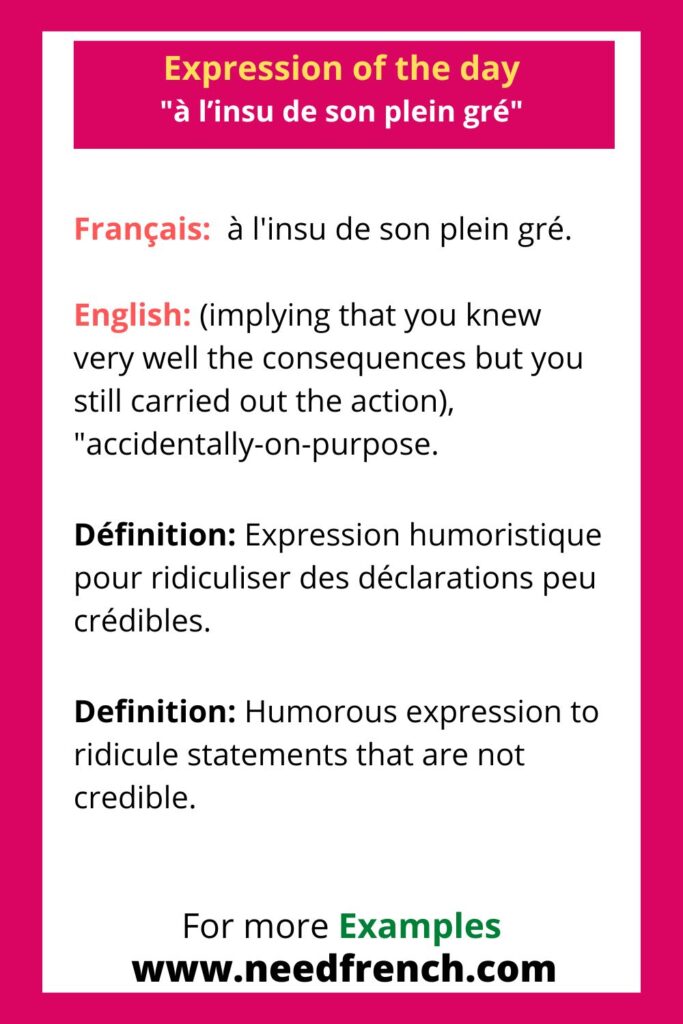The French language is full of beautiful expressions that can add a touch of elegance to your everyday conversation. In this blog post, we’ll discuss the French expression “à l’insu de son plein gré “. Whether you’re a beginner or an advanced learner, we hope you’ll find these useful and fun to use!

Definition & Meaning
Français: à l’insu de son plein gré.
English: accidentally (but not so accidentally), on one’s unwilling will (implying that you knew very well the consequences but you still carried out the action), “accidentally-on-purpose”.
Définition: Tout d’abord, il faut que l’on tienne compte du fait que cette expression est au regard des normes grammaticales, incorrecte et souvent difficile à traduire en anglais. Si elle est prise au premier degrès, l’expression n’a presque aucune signification spéciale, car elle mele deux locutions très différentes — << à l’insu de >> et << de son plein gré >>. Pour donner un peu de contexte, le coureur cycliste Richard Virenque a été soupçonné de dopage lors du Tour de France en 1998, et il a tenté de se défendre en disant qu’il a consommé le dopage sans qu’il le sache et qu’il a apparemment consommé le dopage contre sa volonté et c’est à ses défenses bizarres que l’on doit l’expression ironique et humoristique << à l’insu de son plein gré >>. Par ailleurs, une série télévisée qui s’appelait les Guignols de l’info s’est mise en tete de se moquer des conneries de Virenque et l’expression est rapidement devenue la façon de ridiculiser un sportif ayant un QI de 0 qui utilise des expressions sans trop savoir ce qu’elles signifient.
Definition: Notice how there doesn’t exist a single “definite” translation for this weird little expression because how can that happen if the French expression is itself capable of bewildering even the most erudite scholars of l’Académie Française? (Just joking.) The backstory to its origin is that a French cyclist by the name of Richard Virenque, who happened to be very popular at the time for his boyish antics, failed at several attempts to defend his alleged involvement in a doping scandal. He purportedly told journalists during an interview that he took drugs without his knowledge and perhaps against his own free will.
The way he worded his defense, however, was a bit confusing for some because it juxtaposed two seemingly different expressions (without his knowledge) and (against his own free will) into a single, incongruous sentence that made little to no sense. A French satirical show, les Guignols de l’info, picked up on this peculiar excerpt of the interview and decided to produce a whole segment on it, during which they overly exaggerated the cyclist’s defense in part to mock his self-denial and in part to ridicule his faulty grammar. The show, being extremely popular, quickly diffused this newfound expression across the Holy Land of France, and many people caught on to it as a way to mock the everyday follies of athletes. Simply put: To err is human, but denying doping allegations on the basis that you WERE indeed doped, but against your own free will is a tad bit across the line.
Example
Exemple: J’ai écrasé un homme dans la rue l’autre jour, mais je l’ai fait à l’insu de mon plein gré.
Example: I ran over a man in the streets the other day, but it was done without my informed knowledge.
Do you know other examples tell us all about them in the comments?













